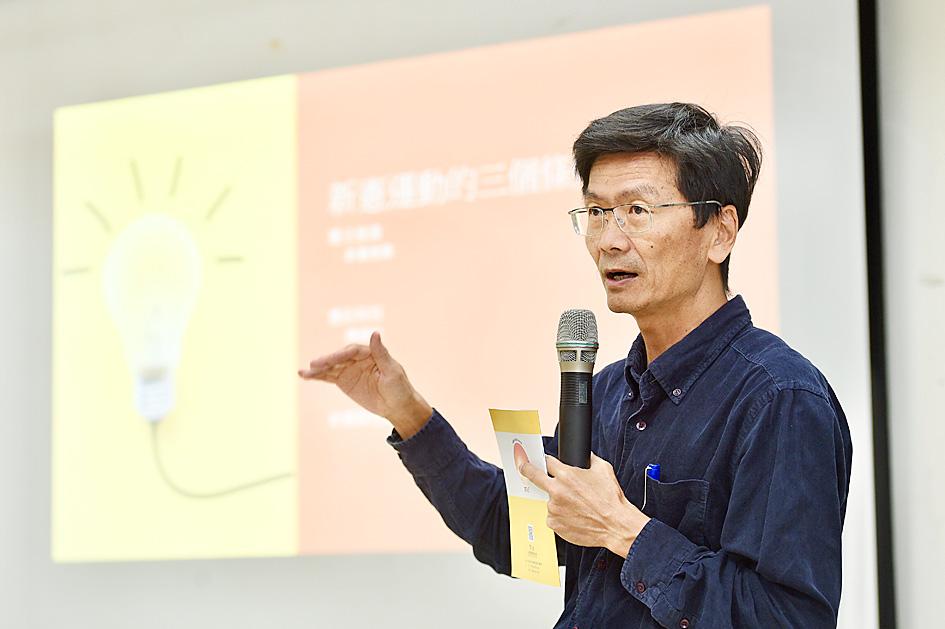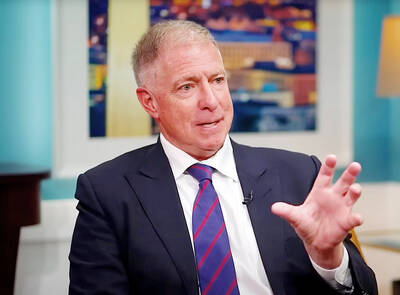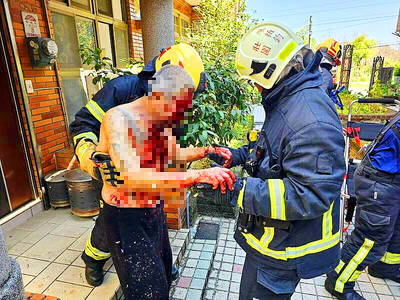If the nation is to ratify a new constitution, it must first end any illusions about the current document’s relevance to Taiwan, an academic told a forum in Taipei yesterday.
For the constitutional revisionist movement to succeed, it needs public enthusiasm, the right timing and a clear plan of action, Chung Yuan Christian University associate professor Hsu Wei-chun (徐偉群) told attendees at the event titled “Imagining a New Constitution for a New Era,” which was organized by the National Taiwan University Graduate Student Association.
The Constitution exists under the “one China” framework and has little relevance to Taiwan, Hsu said, adding that there have been calls to rewrite it for more than 40 years, but such social movements take time.

Photo: Peter Lo, Taipei Times
As a constitution is a highly political document that is deeply connected to a nation’s character, it must be considered when diagnosing political ailments and when imagining what kind of a country its people wish to have, he said.
Therefore, Taiwanese must become familiar with the Constitution, but at present, it is disconnected from people’s daily lives, he said, adding that if people truly want a new nation, drafting a new constitution is imperative.
Hsu said that reformers should focus on two key aspects: the Constitution’s “one China” framework and transforming governance.
Considering Taiwan’s precarious status, the “one China” framework is intertwined with Chinese aggression, yet has little to do with Taiwan itself, he said, adding that drafting a new Constitution could help the nation diagnose its political challenges and implement reform.
However, most important is how Taiwanese view their relationship with China, Hsu said.
For example, Hsu said that he still has students who think that the Shanxi and Yunnan provinces are part of the Republic of China, so to illustrate the problem, he asks them how the government should tackle crime in those regions.
Breaking this illusion of affiliation is difficult, but as Chinese aggression rises, so does Taiwanese consciousness, he said.
People’s lives have become more connected to this land, Hsu said, adding that he is optimistic about the future, as Taiwanese would have the chance to decide for themselves.
Hsu, who also serves on the executive committee of the Civil Alliance to Promote Constitutional Reform, has twice before participated in constitutional reform movements.
During the Sunflower movement, Hsu petitioned to convene a constitutional convention. After the 2016 presidential election, the alliance proposed four priorities for constitutional reform: lowering the voting age to 18, lowering the threshold for constitutional referendums, reforming the apportionment of legislator-at-large seats and revising the human rights clause.

A total lunar eclipse coinciding with the Lantern Festival on March 3 would be Taiwan’s most notable celestial event this year, the Taipei Astronomical Museum said, urging skywatchers not to miss it. There would be four eclipses worldwide this year — two solar eclipses and two lunar eclipses — the museum’s Web site says. Taiwan would be able to observe one of the lunar eclipses in its entirety on March 3. The eclipse would be visible as the moon rises at 5:50pm, already partly shaded by the Earth’s shadow, the museum said. It would peak at about 7:30pm, when the moon would

DEFENSE: The US should cancel the US visas or green cards of relatives of KMT and TPP lawmakers who have been blocking the budget, Grant Newsham said A retired US Marine Corps officer has suggested canceling the US green cards and visas of relatives of opposition Taiwanese lawmakers who have been stalling the review of a proposed NT$1.25 trillion (US$39.7 billion) special defense budget. The Executive Yuan has proposed the budget for major weapons purchases over eight years, from this year to 2033. However, opposition lawmakers have refused to review the proposal, demanding that President William Lai (賴清德) first appear before the Legislative Yuan to answer questions about the proposed budget. On Thursday last week, 37 bipartisan US lawmakers sent a letter to Legislative Speaker Han Kuo-yu (韓國瑜), the heads

A New York-based NGO has launched a global initiative to rename the nation’s overseas missions, most of which operate under the name "Taipei," to "Taiwan Representative Office (TRO)," according to a news release. Ming Chiang (江明信), CEO of Hello Taiwan, announced the campaign at a news conference in Berlin on Monday, coinciding with the World Forum held from Monday through Wednesday, the institution stated in the release. Speaking at the event, Democratic Progressive Party Legislator Huang Jie (黃捷) said she believed this renaming campaign would enable the international community to see Taiwan

Two siblings in their 70s were injured yesterday when they opened a parcel and it exploded, police in Yilan said, adding the brother and sister were both in stable condition. The two siblings, surnamed Hung (洪), had received the parcel two days earlier but did not open it until yesterday, the first day of the Lunar New Year holiday in Taiwan, police said. Chen Chin-cheng (陳金城), head of the Yilan County Government Police Bureau, said the package bore no postmark or names and was labeled only with the siblings’ address. Citing the findings of a